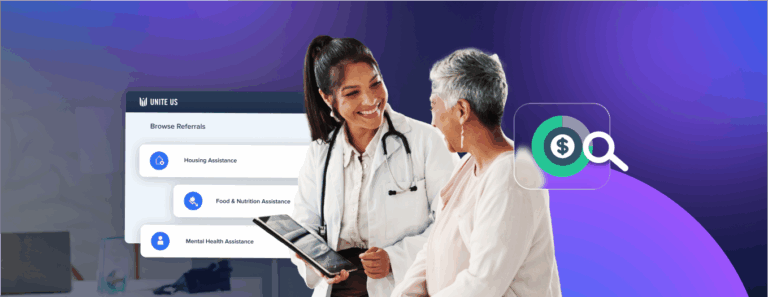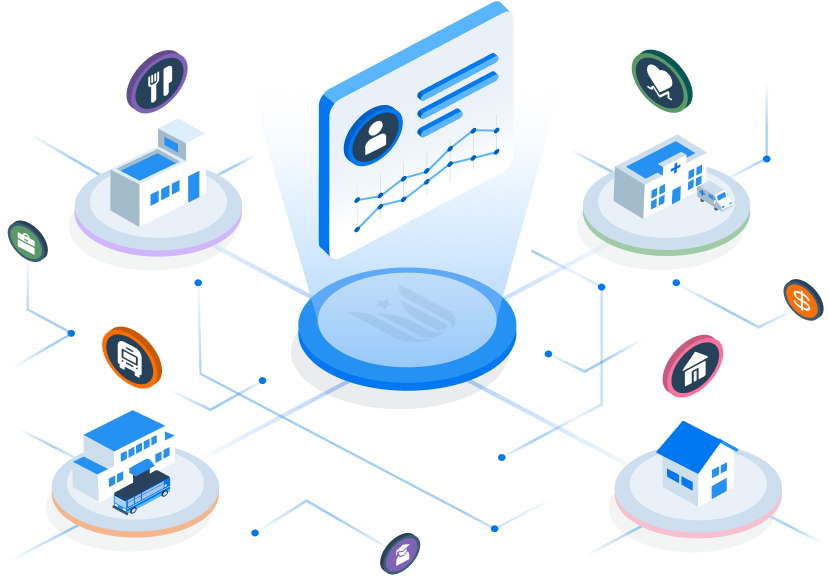How Gwinnett County Reclaimed 2,000 Staff Hours, Delivered $200K in Healthcare Savings, and Strengthened Economic Stability
Leveraging Unite Us’ flexible infrastructure for public health, Gwinnett County Health and Human Services’ One Stop for Help program is strengthening economic stability for constituents—all while improving local government efficiency, saving staff time, and driving significant healthcare savings.
Background
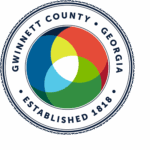 Located in northern Georgia, Gwinnett County Health and Human Services (HHS) has a longstanding commitment to enhancing the well-being of its community. Recognizing the evolving needs of its diverse population, Gwinnett County HHS introduced the One Stop for Help initiative during the COVID-19 pandemic, providing a centralized point of access to a wide array of community-based services. Residents can connect with a team of community navigators ready to offer support by phone, email, an online assistance form, and in-person visits.
Located in northern Georgia, Gwinnett County Health and Human Services (HHS) has a longstanding commitment to enhancing the well-being of its community. Recognizing the evolving needs of its diverse population, Gwinnett County HHS introduced the One Stop for Help initiative during the COVID-19 pandemic, providing a centralized point of access to a wide array of community-based services. Residents can connect with a team of community navigators ready to offer support by phone, email, an online assistance form, and in-person visits.
Goals

Challenge
Before adopting Unite Us’ platform, Gwinnett County HHS faced significant operational challenges in managing its referral and support processes. The department relied on a manual Excel spreadsheet system to track client interactions and coordinate services. While this method allowed for basic documentation, it proved to be inefficient and time-consuming as the volume of community needs increased.
This manual approach also created inconsistencies in how employees recorded notes and followed up with clients. Each navigator had their own method of tracking interactions, which led to a fragmented system with little standardization. As a result, important information was often difficult to locate or incomplete, and the team was forced to spend time handling duplicate entries or conducting repeat calls to verify client information for accuracy. These inefficiencies not only affected internal workflows but also hindered the organization’s ability to provide timely, coordinated care. The lack of a centralized, accessible database similarly limited Gwinnett County HHS’s capacity to analyze trends, measure impact, or streamline services across the various agencies involved.
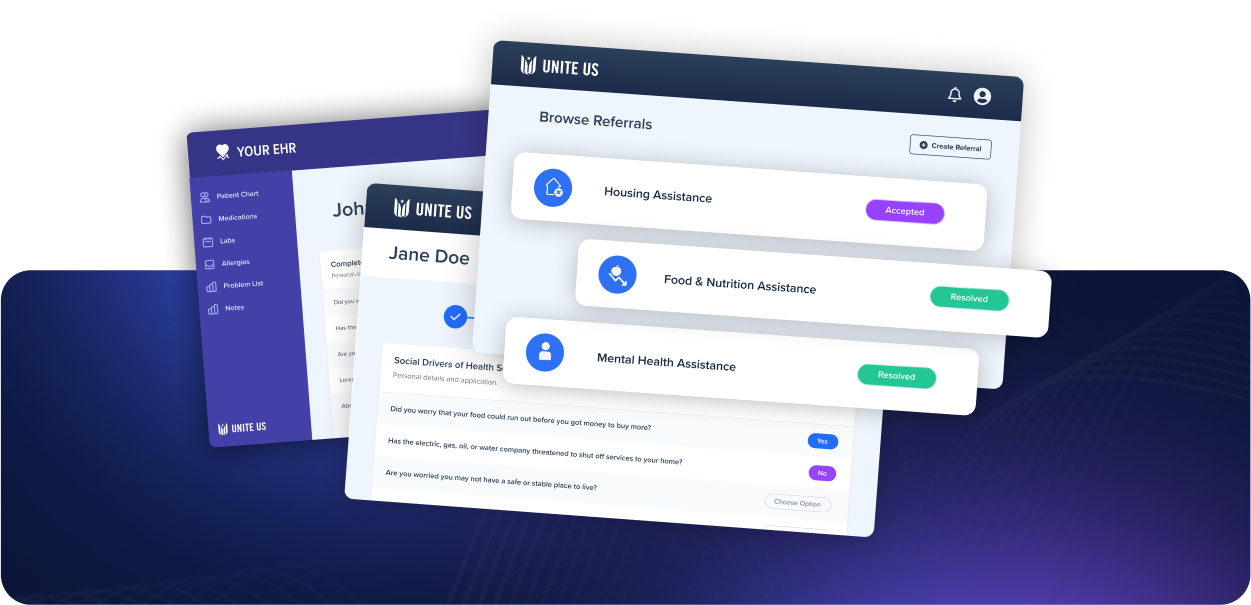
Solution
To address these operational challenges, Gwinnett County HHS engaged Unite Us’ closed-loop referral system. The transition to Unite Us marked a substantial improvement in how the division manages client information, tracks referrals, and facilitates consistent communication among team members. With a centralized and secure system, Gwinnett County HHS can now manage cases more efficiently and improve service coordination for residents.
Additionally, Gwinnett County HHS also leverages Unite Us Insights, a powerful analytics tool that enables the department to derive meaningful information from client interactions and service outcomes. Unite Us Insights helps generate detailed monthly reports, identify service gaps, and support strategic decision-making. It also has become an essential resource for responding to special data requests from stakeholders such as the Gwinnett County Board of Commissioners.
“Through our purchasing process, we sought a platform that treats residents as people, not just cases. Unite Us stood out for combining meaningful personal interaction with smart automation and national reach–ensuring residents can stay connected to help, wherever they are.”
Regina Miller, Deputy Department Director, Community Services, Gwinnett County
Impact
Gwinnett County HHS’s connection with Unite Us has increased both the division’s reach and efficiency, enabling caseworkers to serve a greater number of constituents while substantially decreasing the time it takes for each referral. Whereas previously each person’s information was often entered multiple times and records of previous visits were incomplete or hard to find, Unite Us allows caseworkers to pull up a person’s longitudinal care record with the click of a button and refer them to the appropriate service in a matter of minutes.
Since adopting Unite Us, Gwinnett County community navigators have saved 1,881 hours while connecting 6,410 residents to approximately 9,000 individual services.
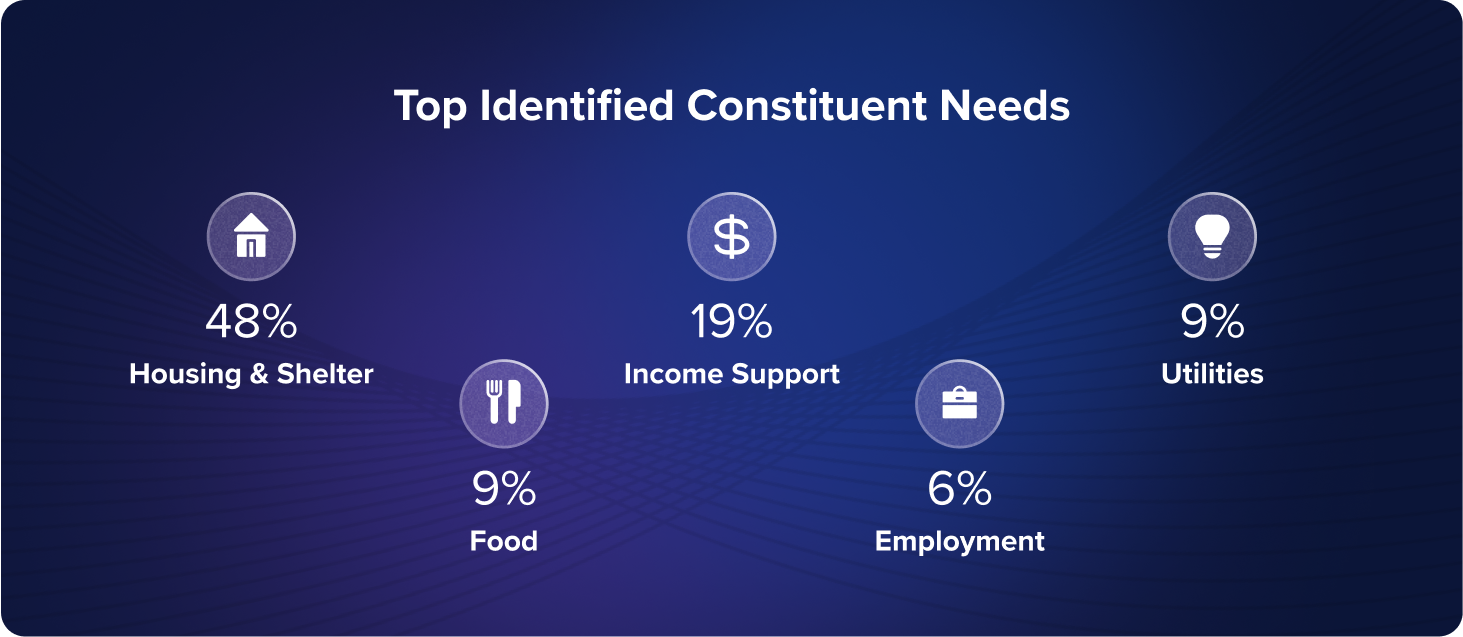
 4,309 individuals connected to ~9,000 services
4,309 individuals connected to ~9,000 services
Gwinnett County residents connected to Unite Georgia programs (e.g. food, housing, transportation).
 $3M in increased household funds
$3M in increased household funds
Estimated annual value generated by resolution of basic needs for Gwinnett County households.
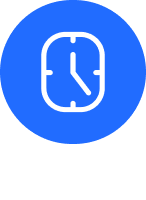 1,861 hours in efficiency gains
1,861 hours in efficiency gains
Estimated 13 min time savings for each referred case based on a matched longitudinal survey of Unite Us end users
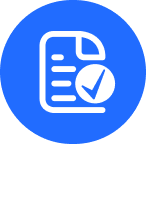 $51K in administrative savings
$51K in administrative savings
Estimated based on an average $27 hourly Gwinnett County case manager salary and total hours saved.
 $194k in healthcare cost savings
$194k in healthcare cost savings
Estimated healthcare cost savings (reduced ED visits and inpatient stays), realized by addressing Food Insecurity as the top non-medical need, per Health Begins ROI calculator for social needs.
Client Success Story
 A single woman with physical disabilities in need of financial assistance faced repeated roadblocks trying to access SNAP and Medical Assistance. On her third attempt, she was denied benefits due to a missed interview, despite never having received a call. Navigating a complex and often opaque government benefits system made it extremely difficult to get her case in front of the right people. Without a clear path forward, she struggled to get her basic needs met.
A single woman with physical disabilities in need of financial assistance faced repeated roadblocks trying to access SNAP and Medical Assistance. On her third attempt, she was denied benefits due to a missed interview, despite never having received a call. Navigating a complex and often opaque government benefits system made it extremely difficult to get her case in front of the right people. Without a clear path forward, she struggled to get her basic needs met.
The Unite Us platform supported seamless coordination between Gwinnett County and Georgia Division of Family and Children Services, enabling staff to track the case throughout the process and submit supplemental food referrals to address the client’s immediate needs.
Lessons Learned

Three main themes emerged from Unite Us’ partnership with Gwinnett County’s One Stop for Help initiative:
- Modernizing infrastructure increases efficiency: One of the most critical lessons learned was the importance of modernizing infrastructure to support efficiency and service quality. Relying on manual processes such as Excel spreadsheets for coordinating referrals and tracking client interactions created bottlenecks and inconsistencies that hindered the program’s effectiveness. Transitioning to the Unite Us platform was a technological upgrade that enabled better coordination, accountability, and outcomes.
- Standardizing and centralizing processes improves the client experience: Prior to using Unite Us, staff members each had their own way of recording notes and following up with clients, leading to disjointed communication and errors. Unite Us provided a structured, unified system that enables consistent documentation of interactions and timely, traceable follow-ups. This has significantly improved the client experience and allowed staff to work more efficiently.
- Real-time data and analysis leads to stronger performance: The integration of Unite Us Insights has underscored the importance of real-time data analysis and reporting. Gwinnett County HHS discovered that having access to this up-to-date information is essential for making informed decisions, addressing service gaps, and demonstrating impact to stakeholders. Access to timely, accurate data has been critical for internal performance monitoring, advocating for necessary resources, and guiding future program development.
About Unite Us
Unite Us is the nation’s leading software company bringing sectors together to improve the health and well-being of communities. We drive the collaboration to identify, deliver, and pay for services that impact whole-person health. Through Unite Us’ national network and software, community-based organizations, government agencies, and healthcare organizations are all connected to better collaborate to meet the needs of the individuals in their communities.


